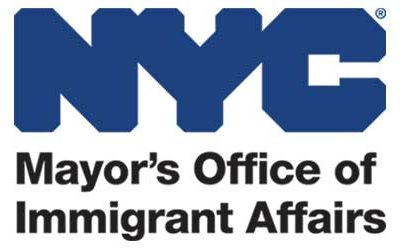Family Resources

Food Assistance The City of New York is providing assistance to New Yorkers in need of food assistance.
You can visit NYC311 here to learn more about food services that are available.
World Central KItchen WCK distributing meals in The Bronx, Queens, Harlem, Brooklyn & New Jersey
View Locations
Invisible Hands Invisible Hands is a group of engaged volunteers from communities at the least risk for severe COVID-19 reactions working to bring groceries and supplies to those in high-risk demographics. We’re focused most prominently on the elderly, disabled, and immunocompromised, but are available to help anyone in need.
Learn more here

Family Justice Centers New York City Family Justice Centers are available by phone to provide immediate crisis support and advocacy. On Monday to Friday, 9 a.m. to 5 p.m., they are answering FJC phone lines and connecting clients to Community Based Organizations and partner agencies to provide vital services including legal consultations, counseling sessions, safety planning, case management sessions, and more. Between 9 a.m. to 5 p.m. on Monday through Friday, survivors can reach each FJC directly, by phone:
Brooklyn: 718-250-5113
The Bronx: 718-508-1220
Manhattan: 212-602-2800
Queens: 718-575-4545
Staten Island: 718-697-4300
During evenings and weekends, victims and survivors can access help and resources by: Calling NYC’s 24-hour Domestic Violence Hotline (800-621-4673); or Visiting the NYC HOPE Resource Directory online at www.nyc.gov/NYCHOPE
LIFT - Justice for All. One family at a time Helping New Yorkers find justice in Family Court since 1996. Learn more

The New York City Human Resources Administration/Department of Social Services (HRA/DSS) provides temporary help to individuals and families with social service and economic needs to help them reach independence.
You can find out if you are eligible for Public Assistance, also known as Cash Assistance. You can apply for cash benefits and participate in programs that prepare you for self-sufficiency. Most benefits are provided on an electronic card that is used like an ATM card.
Eligible families may receive up to 60 months of federally funded Cash Assistance under the Temporary Assistance to Needy Families Program (TANF). Single individuals without children and families who have already received Cash Assistance for 60 months may receive benefits under the New York State Safety Net Assistance Program.
Caregivers who are not foster parents but are financially responsible for children in their care may also be eligible for Cash Assistance.
Temporary benefits include:
- A cash grant that includes a shelter/rent portion
- Utility assistance grants
- Additional money to assist with other expenses
You can learn more about eligibility and the application process from the Human Resources Administration (HRA). You can also find out your case status.
Learn more about Public Assistance (Cash Assistance)
With ACCESS HRA, you can apply for some HRA benefits, submit documents for your application, manage your case, and much more! Use these resources to help get started: Learn more
To obtain public assistance call HRA/DSS at (718) 557-1399

Talking About Race with Young Children
NPR offers a 20 minute radio story for parents and caregivers, “Even babies notice differences like skin color, eye shape and hair texture. Here’s how to handle conversations about race, racism, diversity and inclusion, even with very young children.” Link to NPR Radio Story
The Child Mind Institute offers advice to parents on talking to children about race and violence in America. Link to Child Mind Institute.
Raising Luminaries provides specific advice for caregivers in “Anti-Racism 101: Starting to Talk About Race”. Link to Raising Luminaries.
Sesame Street and CNN host a town hall addressing race with young children. Link to town hall.
Anti-Racism Children’s Media
Fabienne Doucet’s #KidLit Resources Collection. Fabienne Doucet is an Associate Professor of Early Childhood and Urban Education at NYU. The resources list is geared at engaging children in complex conversations and provides a “non-exhaustive list of children’s books covering various social issues around equity and social justice.” Link to #KidLit
HealthLine Parenthood suggests a list of anti-racism books and other media for parents and children as young as infants. Link to HealthLine List.
Raising Luminaries provides a list of children’s books written by Black women and nonbinary authors. Link to book list.
A Kids Book About Racism is a book that has “a clear description of what racism is, how it makes people feel when they experience it, and how to spot it when it happens.” Link to book website.

Let’s Learn NYC! is a new educational public television program for children in grades 3K through second grade, which offers lessons to supplement remote learning.
Targeted for ages 3 through 8, the age-appropriate curricular content of Let’s Learn NYC is aligned to DOE standards and lessons for early childhood education. Episodes include a mix of foundational reading skills, literacy, math, social studies, and science.
Literacy lessons will focus on foundational skills such as phonics and fluency, reading vocabulary and comprehension, and writing.
Each episode will include a “story time”that helps students connect the literacy instruction to important facets of their lives and experience the power and pleasure that literacy offers.
Other lessons will focus on having fun with numbers, discovering science, and finding out about the world around us.
The hosts of Let’s Learn NYC! are DOE instructional leaders and coaches with expertise in teaching young learners.
Let’s Learn NYC! airs Monday – Friday, 12 p.m – 1 p.m.
You can also livestream the episodes at thirteen.org/live.
Following each broadcast, each episode and supplemental learning materials will be available on schools.nyc.gov and thirteen.org/letslearn.
Parent University
Parent University seeks to educate and empower families as partners, advocates, and lifelong educators in their student's education through free courses, resources, events, and activities.


